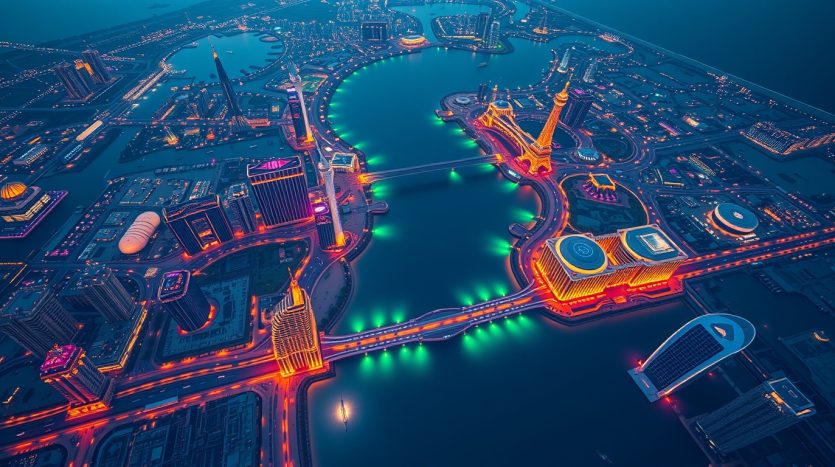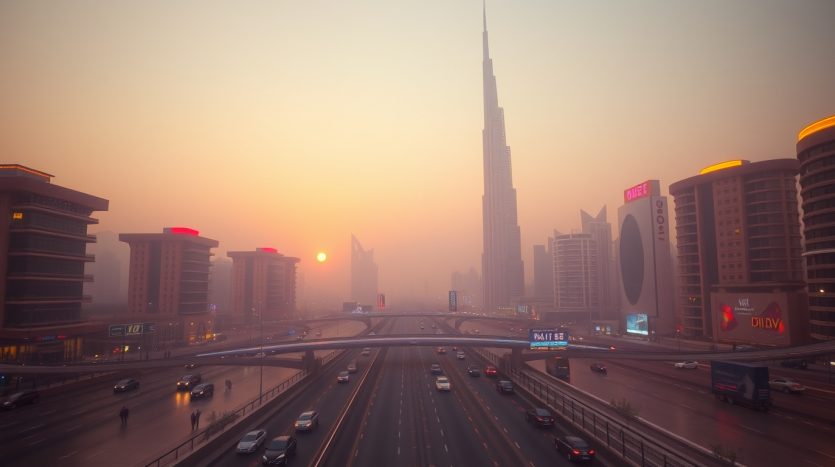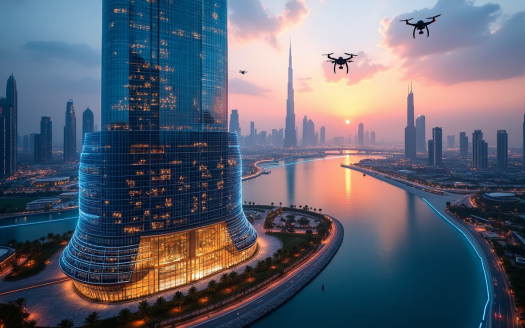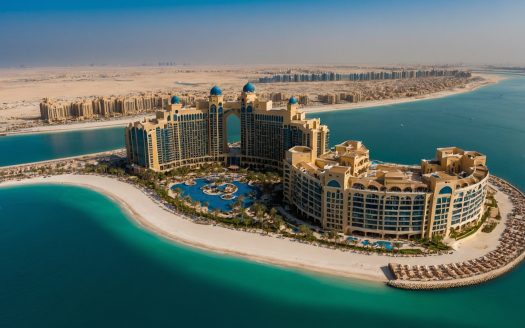The Role of Real Estate in Dubai’s Vision 2040
Urban PlanDubai’s ambitious Vision 2040 Urban Master Plan represents a transformative blueprint for the emirate’s future development, with far-reaching implications for its real estate sector. This comprehensive strategy aims to cement Dubai’s position as a global leader in urban living, economic growth, and sustainability. By emphasizing quality of life, smart city technologies, and sustainable practices, the plan is set to reshape Dubai’s urban landscape and create unprecedented opportunities for real estate investors and developers.
As Dubai continues its journey towards becoming one of the world’s most livable and prosperous cities, the real estate industry stands at the forefront of this evolution. From the creation of new urban centers to the revitalization of existing communities, the sector plays a pivotal role in translating the vision into tangible realities. This article explores the multifaceted ways in which real estate is poised to support and benefit from Dubai’s Vision 2040, examining the key trends, challenges, and opportunities that lie ahead.
A New Era of Urban Development
The Vision 2040 Urban Master Plan marks a paradigm shift in Dubai’s approach to city planning and development. At its core, the plan seeks to create a more balanced, sustainable, and human-centric urban environment. This section delves into the key aspects of this new era of urban development and its implications for the real estate sector.
Reimagining Urban Spaces
One of the central tenets of Vision 2040 is the reimagining of Dubai’s urban spaces. The plan calls for the creation of vibrant, mixed-use communities that seamlessly blend residential, commercial, and recreational areas. This approach aims to reduce commute times, enhance social interactions, and improve overall quality of life.
For real estate developers, this shift presents both challenges and opportunities. Projects will need to be conceived with a holistic view of community needs, incorporating elements such as green spaces, pedestrian-friendly layouts, and diverse amenities. The focus on creating self-contained neighborhoods may lead to increased demand for multi-purpose developments that offer a range of housing options alongside retail, office, and leisure facilities.
Sustainable Design and Construction
Sustainability is a key pillar of Vision 2040, and the real estate sector is expected to play a crucial role in realizing this goal. The plan emphasizes the adoption of green building practices, energy-efficient technologies, and environmentally friendly materials. This focus on sustainability is likely to drive innovation in construction techniques and building design.
Real estate developers and investors who embrace these principles early on may gain a competitive edge in the market. Properties that meet or exceed sustainability standards are likely to command premium prices and attract environmentally conscious tenants and buyers. Additionally, the push for sustainability may open up new niche markets, such as eco-friendly residential communities or net-zero energy commercial buildings.
Smart City Integration
Vision 2040 envisions Dubai as a leading smart city, leveraging cutting-edge technologies to enhance urban living. This includes the integration of Internet of Things (IoT) devices, artificial intelligence, and data analytics to optimize city operations and improve resident experiences.
For the real estate sector, this technological revolution presents exciting possibilities. Smart buildings that can monitor and adjust energy usage, predict maintenance needs, and enhance security will become increasingly prevalent. Real estate companies that invest in developing expertise in smart home technologies and data-driven property management solutions will be well-positioned to capitalize on this trend.
Expanding Urban Centers and New Growth Corridors
A key component of Dubai’s Vision 2040 is the strategic expansion and development of urban centers across the emirate. This section examines how these plans will shape real estate opportunities and investment patterns in the coming decades.
Revitalizing Established Districts
The plan places significant emphasis on rejuvenating and enhancing Dubai’s historic areas, such as Deira and Bur Dubai. These districts are set to undergo careful redevelopment to preserve their cultural heritage while upgrading infrastructure and amenities to meet modern standards.
For real estate investors, these areas may offer unique opportunities to acquire and renovate properties in prime locations. The blend of historical charm and modern conveniences could create highly desirable residential and commercial spaces, potentially yielding strong returns as these districts are revitalized.
Emerging Urban Hubs
Vision 2040 outlines the creation of new urban centers to accommodate Dubai’s growing population and diversify its economic base. Areas such as Dubai South, centered around Al Maktoum International Airport, and the Dubai Silicon Oasis are poised to become major growth corridors.
These emerging hubs present greenfield opportunities for real estate developers to create innovative, master-planned communities from the ground up. Early investment in these areas could yield significant long-term returns as infrastructure develops and population density increases.
Waterfront Development
Dubai’s coastline remains a key asset, and Vision 2040 includes plans for further waterfront development. Projects like Dubai Harbour and the expansion of Palm Jumeirah showcase the continued appeal of coastal living and leisure facilities.
Real estate companies specializing in luxury waterfront properties or mixed-use marina developments may find ample opportunities to cater to high-end local and international buyers. The integration of sustainable practices in these coastal projects will be crucial to align with the overall vision of environmental responsibility.
Infrastructure and Connectivity Enhancements
The success of Vision 2040 hinges on significant improvements to Dubai’s infrastructure and transportation networks. This section explores how these enhancements will impact real estate development and property values across the emirate.
Public Transportation Expansion
A cornerstone of the plan is the expansion and integration of Dubai’s public transportation system. This includes extensions to the metro network, new tram lines, and enhanced bus services. The goal is to create a city where residents can access 80% of their daily needs within a 20-minute journey.
For real estate developers, proximity to public transport hubs will become an even more critical factor in project planning. Properties located near metro stations or major transit corridors are likely to see increased demand and potentially higher valuations. This may drive a trend towards transit-oriented developments that maximize accessibility and convenience for residents.
Road Network Improvements
While public transport is a focus, Vision 2040 also includes plans for enhancing Dubai’s road infrastructure. This includes new bridges, tunnels, and smart traffic management systems to reduce congestion and improve connectivity between different areas of the city.
Real estate investors should pay close attention to planned road projects, as improved accessibility can significantly boost property values in previously underserved areas. Developments that can offer easy access to major highways while maintaining a sense of community and tranquility may be particularly attractive to buyers and tenants.
Digital Infrastructure
The plan emphasizes the importance of robust digital infrastructure to support Dubai’s ambitions as a smart city and global business hub. This includes the rollout of 5G networks, citywide Wi-Fi coverage, and advanced data centers.
For the real estate sector, this digital focus opens up new possibilities in terms of building management and tenant services. Properties that offer cutting-edge digital amenities, such as high-speed internet access and smart home integration, may command a premium in the market. Commercial real estate developers may also find opportunities in creating specialized facilities to house data centers and tech-focused businesses.
Sustainable Living and Green Spaces
Vision 2040 places a strong emphasis on enhancing Dubai’s green spaces and promoting sustainable living practices. This section examines how these environmental priorities will shape real estate development and consumer preferences in the coming years.
Expanding Public Parks and Nature Reserves
The plan aims to significantly increase the amount of green space in Dubai, with a target of doubling the area dedicated to public parks and nature reserves. This initiative is designed to improve air quality, provide recreational opportunities, and enhance the overall livability of the city.
Real estate developers can capitalize on this trend by incorporating green spaces into their projects or by creating developments that offer easy access to public parks. Properties adjacent to newly created green areas may see increased demand and appreciation in value. There may also be opportunities for eco-tourism developments that cater to nature enthusiasts while adhering to sustainable practices.
Sustainable Housing Initiatives
Vision 2040 encourages the development of sustainable housing options that minimize environmental impact and reduce energy consumption. This includes the promotion of green building standards, solar energy integration, and water conservation measures.
For the real estate sector, this focus on sustainability presents both challenges and opportunities. Developers will need to adapt to more stringent environmental regulations and potentially higher upfront costs for sustainable technologies. However, properties that meet high sustainability standards may command premium prices and attract environmentally conscious buyers and tenants. There may also be opportunities to develop niche markets for ultra-sustainable or off-grid housing options.
Urban Farming and Local Food Production
The plan includes initiatives to promote urban farming and local food production, aiming to enhance food security and reduce the city’s carbon footprint. This could lead to the integration of community gardens, rooftop farms, and vertical agriculture into urban developments.
Real estate companies that incorporate urban farming elements into their projects may find a unique selling point that appeals to health-conscious and environmentally aware residents. There may also be opportunities to develop specialized agricultural real estate, such as high-tech vertical farming facilities or mixed-use developments that combine residential spaces with food production areas.
Economic Diversification and Real Estate Opportunities
Dubai’s Vision 2040 aims to further diversify the emirate’s economy, creating new sectors and expanding existing ones. This economic transformation will have significant implications for the real estate market, opening up new opportunities and reshaping demand patterns.
Knowledge-Based Economy Hubs
The plan emphasizes the development of knowledge-based economy hubs, focusing on sectors such as technology, research and development, and creative industries. This initiative aims to position Dubai as a global center for innovation and entrepreneurship.
For the real estate sector, this focus on knowledge-based industries may drive demand for specialized commercial spaces. There may be opportunities to develop innovation districts, research parks, or mixed-use developments that cater to tech startups and creative businesses. Properties that offer flexible workspaces, advanced digital infrastructure, and collaborative environments may be particularly attractive to these sectors.
Tourism and Hospitality Expansion
Vision 2040 includes ambitious plans to further enhance Dubai’s position as a global tourism destination. This includes the development of new attractions, expansion of hotel capacity, and creation of unique experiences to attract a diverse range of visitors.
Real estate investors and developers in the hospitality sector may find significant opportunities as Dubai expands its tourism infrastructure. This could include the development of new hotels, resorts, and serviced apartments, as well as mixed-use projects that combine hospitality elements with retail and entertainment facilities. There may also be niche opportunities in eco-tourism or cultural heritage tourism, aligning with the plan’s focus on sustainability and preserving local identity.
Healthcare and Education Clusters
The plan emphasizes the development of world-class healthcare and education facilities to serve both local residents and international visitors. This includes the creation of specialized medical districts and the expansion of higher education institutions.
For the real estate sector, this focus on healthcare and education may create demand for purpose-built facilities such as medical centers, research laboratories, and student housing. There may also be opportunities to develop mixed-use communities centered around major hospitals or universities, catering to the needs of healthcare professionals, students, and related businesses.
Adapting to Changing Demographics and Lifestyles
Dubai’s Vision 2040 takes into account the evolving demographics and lifestyle preferences of its residents. This section explores how these changes will influence real estate development and investment strategies in the coming decades.
Multigenerational Housing Solutions
As Dubai’s population ages and family structures evolve, there is likely to be increased demand for multigenerational housing options. The plan recognizes the need for flexible living arrangements that can accommodate extended families or provide support for elderly residents.
Real estate developers may find opportunities in creating innovative housing designs that cater to multigenerational living. This could include properties with separate but connected living spaces, or communities that offer a range of housing types to accommodate different family sizes and needs. There may also be demand for age-friendly developments that provide amenities and support services for older residents.
Co-Living and Shared Spaces
The rise of the sharing economy and changing attitudes towards ownership may drive demand for co-living arrangements and shared spaces, particularly among younger residents and expatriates. Vision 2040 acknowledges the need for diverse housing options to cater to different lifestyle preferences.
Real estate companies may explore opportunities in developing co-living spaces that offer private bedrooms with shared common areas and amenities. These developments could cater to young professionals, students, or digital nomads seeking flexible and affordable housing options. There may also be potential for hybrid models that combine co-living spaces with co-working facilities, creating integrated live-work communities.
Wellness-Focused Developments
The plan emphasizes the importance of promoting health and well-being among Dubai’s residents. This focus on wellness is likely to influence real estate development trends, with increased demand for properties and communities that support healthy lifestyles.
Developers may find success in creating wellness-centered communities that offer amenities such as fitness centers, walking and cycling trails, and spaces for meditation and yoga. There may also be opportunities to integrate health-monitoring technologies into residential properties, aligning with the smart city vision. Commercial real estate could see demand for office spaces that prioritize employee well-being through features like natural lighting, indoor air quality management, and ergonomic design.
Regulatory Framework and Investment Climate
The success of Vision 2040 relies on a supportive regulatory environment and a favorable investment climate. This section examines how changes in regulations and investment policies may impact the real estate sector and shape opportunities for local and international investors.
Streamlined Approval Processes
The plan includes initiatives to streamline approval processes for real estate developments, aiming to reduce bureaucracy and accelerate project timelines. This could include the implementation of digital platforms for permit applications and the adoption of standardized building codes.
For real estate developers, these streamlined processes may lead to faster project completion times and reduced administrative costs. This efficiency could potentially increase the number of projects that can be undertaken, stimulating growth in the sector. Investors may benefit from quicker returns on their investments due to reduced development timelines.
Foreign Ownership Regulations
Vision 2040 aims to further enhance Dubai’s attractiveness to international investors. This may include continued refinement of foreign ownership regulations in the real estate sector, potentially expanding areas where non-UAE nationals can purchase property or invest in development projects.
These regulatory changes could open up new opportunities for international real estate investors and developers to enter or expand their presence in the Dubai market. It may also lead to increased competition and diversity in the real estate sector, potentially driving innovation and quality improvements.
Sustainable Finance Initiatives
In line with the plan’s focus on sustainability, there may be initiatives to promote sustainable finance in the real estate sector. This could include incentives for green building projects, preferential lending terms for sustainable developments, or the introduction of green bonds for real estate financing.
Real estate companies that align their projects with sustainability goals may find easier access to financing and potentially lower borrowing costs. This could create a competitive advantage for developers who prioritize environmental considerations in their projects. Investors may also see opportunities in sustainable real estate funds or green REITs that cater to the growing demand for responsible investment options.
Challenges and Considerations
While Dubai’s Vision 2040 presents numerous opportunities for the real estate sector, it also comes with challenges that industry stakeholders must navigate. This section explores some of the key considerations and potential hurdles in realizing the plan’s ambitious goals.
Market Saturation and Oversupply
As new developments are launched to support Vision 2040, there is a risk of market saturation in certain segments of the real estate sector. Careful planning and phased development will be crucial to maintain a balance between supply and demand.
Real estate companies will need to conduct thorough market research and feasibility studies to ensure their projects align with actual market needs. Flexibility in project design and the ability to adapt to changing market conditions will be key to success. Investors should carefully assess the potential for oversupply in specific areas or property types before committing to long-term investments.
Affordability Concerns
As Dubai continues to develop and enhance its urban environment, there is a risk that property prices and living costs may rise, potentially creating affordability challenges for some segments of the population. Vision 2040 acknowledges the need for diverse housing options, including affordable housing initiatives.
Developers may need to explore innovative construction techniques and design solutions to create cost-effective housing options without compromising on quality or sustainability. There may be opportunities for public-private partnerships to develop affordable housing projects that align with the overall vision for urban development. Real estate investors should consider the potential for government incentives or subsidies in the affordable housing sector.
Technological Disruption
The rapid pace of technological change presents both opportunities and challenges for the real estate sector. While smart city technologies offer the potential for enhanced efficiency and improved user experiences, they also require significant investment and ongoing adaptation.
Real estate companies will need to stay abreast of technological advancements and be prepared to integrate new solutions into their developments. This may require partnerships with tech firms or the development of in-house expertise in areas such as IoT, artificial intelligence, and data analytics. Investors should consider the long-term adaptability of properties to technological changes when assessing potential investments.
Conclusion
Dubai’s Vision 2040 Urban Master Plan represents a bold and comprehensive approach to shaping the emirate’s future. For the real estate sector, this vision presents a wealth of opportunities across various segments, from sustainable residential developments to innovative commercial spaces and specialized facilities supporting new economic sectors.
The success of this ambitious plan will depend on the collaborative efforts of government entities, private sector developers, investors, and the community at large. By embracing the principles of sustainability, smart city technologies, and human-centric design, the real estate industry can play a pivotal role in transforming Dubai into a global benchmark for urban living and economic prosperity.
As the vision unfolds over the coming decades, stakeholders in the real estate sector must remain agile, innovative, and responsive to changing market dynamics. Those who can align their strategies with the long-term goals of Vision 2040 while addressing immediate market needs will be best positioned to thrive in Dubai’s evolving urban landscape.
The journey towards realizing Dubai’s Vision 2040 promises to be an exciting and transformative one for the real estate sector. By embracing the opportunities and navigating the challenges ahead, industry players can contribute to creating a sustainable, prosperous, and vibrant future for Dubai and its residents.






